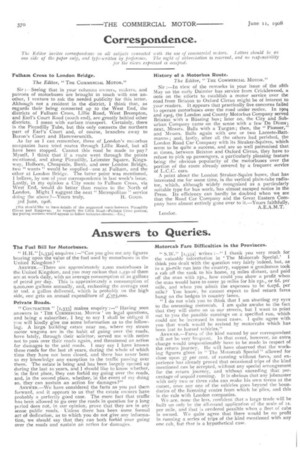Answers to Queries.
Page 16

If you've noticed an error in this article please click here to report it so we can fix it.
The Fuel Bill for Motorbuses.
" H.H." [1,3321 enquires :—"Can you give me any figures bearing upon the value of the fuel used by motorbuses in the United Kingdom?"
_ANSWER. —There are approximately 2,000 motorbuses in the United Kingdom, and you may reckon that 1,230 of them are at work daily, with an average consumption of 20 gallons of petrol per day. This is approximately a consumption of 9,000,00o gallons annually, and, reckoning the average cost at Tod. a gallon delivered, which is probably on the high side, one gets an annual expenditure of ,L-375,000.
Private Roads.
" CONTRACTOR " [1,333] makes enquiry :—" Having seen answers in THE COMMERCIAL MOTOR on legal questions, and being a subscriber, I be to say I shall be obliged if you will kindly give me some information as to the following. A large building estate near me, where my steam motor wagons are in the habit, of going -over the roads, have lately, through their solicitor; served me with notice not to pass over their roads again, and threatened an action for damages to the said roads. I may say I have known these roads for the last 18 years, during the whole of which time they have not been closed, and there has never been to my knowledge any exception to the traffic passing over them. The estate is being and has been largely opened up during the last to years, and I should like to know whether, in the first place, they can forbid my going over the roads, and, in the second place, whether, in the event of my doing so, they can Sustain an action for damages?"
ANSWER.—We have considered the facts as you put them forward, and it appears to us that the estate owners have probably a perfectly good case. The mere fact that traffic has been allowed to go over the roads in question for a long period does not, in our opinion, prove that they are in any sense public roads. • Unless there has been some formal act of dedication; as to which you do not give any information, we should say that they can both forbid your going over the roads and sustain an action for damages.
Motorcab Fare Difficulties in the Provinces.
" S.W." [1,334] writes :—" I thank you very much for the valuable information in 'The Motorcab Special.' I think you dealt with the question very fairly indeed, but, as to a so-mile run into the country, suppose a gentleman took a cab off the rank to his home, 25 miles distant, and paid off the man with 255., how could you show a profit when the man would have to cover so miles for his 25s., or 6d. per mile, and when you admit the expenses to be 6.o7d. per mile? You know, he cannot expect to find return fares hung on the hedges in country lanes.
"I do not wish you to think that I am shutting my eyes to the oncoming motorcab. I am quite awake to the fact that they will come on C0 our streets, but I want to point out to you the possible earnings on a specified run, which could not he increased in most cases. I quite agree with you that work would be revived by motorcabs which has been lost to horsed vehicles."
ANSWER.—Fares of the kind named by our correspondent will not be very frequent. In that event, however, an extra charge would unquestionably have to be made in respect of the return journey. He will have observed that the working figures given in " The Motorcab Special" allowed for close upon 37 per cent. ofrunning without fares,and experience has already proved that occasional trips of the kind mentioned can be accepted, without any special arrangement for. the return journey, and without exceeding that percentage of unpaid running. It is obvious that any jobmaster with only two or three cabs can make his own terms at the outset, .once any one of the vehicles goes beyond the boundaries of the licensing centre frorn which he plies, and this is the rule with London companies.
We are, none the less, confident that a large trade will be built up only by the all-round application of the scale of is. per mite, and that is rendered possible when a fleet of cabs is owned. We quite agree that there would be no profit in running a series of trips of the kind mentioned with any one cab, but that is a hypothetical case.




















